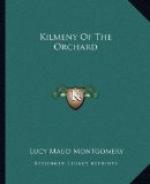When she came to him, radiant, her hands full of the lilies, a couplet from a favourite poem darted into his head—
“A blossom vermeil white
That lightly breaks a faded
flower sheath,
Here, by God’s rood,
is the one maid for me.”
The next moment he was angry with himself for his folly. She was, after all, nothing but a child—and a child set apart from her fellow creatures by her sad defect. He must not let himself think nonsense.
“Thank you. These June lilies are the sweetest flowers the spring brings us. Do you know that their real name is the white narcissus?” She looked pleased and interested.
“No, I did not know,” she wrote. “I have often read of the white narcissus and wondered what it was like. I never thought of it being the same as my dear June lilies. I am glad you told me. I love flowers very much. They are my very good friends.”
“You couldn’t help being friends with the lilies. Like always takes to like,” said Eric. “Come and sit down on the old bench—here, where you were sitting that night I frightened you so badly. I could not imagine who or what you were. Sometimes I thought I had dreamed you—only,” he added under his breath and unheard by her, “I could never have dreamed anything half so lovely.”
She sat down beside him on the old bench and looked unshrinkingly in his face. There was no boldness in her glance—nothing but the most perfect, childlike trust and confidence. If there had been any evil in his heart—any skulking thought, he was afraid to acknowledge—those eyes must have searched it out and shamed it. But he could meet them unafraid. Then she wrote,
“I was very much frightened. You must have thought me very silly, but I had never seen any man except Uncle Thomas and Neil and the egg peddler. And you are different from them—oh, very, very different. I was afraid to come back here the next evening. And yet, somehow, I wanted to come. I did not want you to think I did not know how to behave. I sent Neil back for my bow in the morning. I could not do without it. I cannot speak, you know. Are you sorry?”
“I am very sorry for your sake.”
“Yes, but what I mean is, would you like me better if I could speak like other people?”
“No, it does not make any difference in that way, Kilmeny. By the way, do you mind my calling you Kilmeny?”
She looked puzzled and wrote, “What else should you call me? That is my name. Everybody calls me that.”
“But I am such a stranger to you that perhaps you would wish me to call you Miss Gordon.”
“Oh, no, I would not like that,” she wrote quickly, with a distressed look on her face. “Nobody ever calls me that. It would make me feel as if I were not myself but somebody else. And you do not seem like a stranger to me. Is there any reason why you should not call me Kilmeny?”




